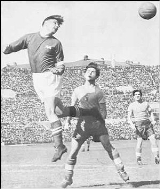
Anatoli Bashashkin
Encyclopedia
Anatoli Vasilievich Bashashkin ' onMouseout='HidePop("27670")' href="/topics/Reutov">Reutov
Reutov
Reútov is a town in Moscow Oblast, Russia, located east of Moscow. Population: 50,200 .In 2007, Reutov was named one of the best places to live in the Russian Federation in the category of small towns with a population of fewer than 100,000 people....
o, Moscow Governorate
Moscow Governorate
Moscow Governorate , or Government of Moscow, was an administrative division of the Russian Empire, which existed in 1708–1929....
, Russia
Russia
Russia or , officially known as both Russia and the Russian Federation , is a country in northern Eurasia. It is a federal semi-presidential republic, comprising 83 federal subjects...
– 27 July 2002, Moscow
Moscow
Moscow is the capital, the most populous city, and the most populous federal subject of Russia. The city is a major political, economic, cultural, scientific, religious, financial, educational, and transportation centre of Russia and the continent...
, Russia
Russia
Russia or , officially known as both Russia and the Russian Federation , is a country in northern Eurasia. It is a federal semi-presidential republic, comprising 83 federal subjects...
) was a Russian footballer in the 1940s and 1950s and a football coach later. He played as a central defender.
He was captain of the Soviet Union at the 1952 Olympics
1952 Summer Olympics
The 1952 Summer Olympics, officially known as the Games of the XV Olympiad, were an international multi-sport event held in Helsinki, Finland in 1952. Helsinki had been earlier given the 1940 Summer Olympics, which were cancelled due to World War II...
, but following their politically embarrassing defeat to Yugoslavia
Yugoslavia national football team
The Yugoslavia national football team represented the Kingdom of Yugoslavia and the Socialist Federal Republic of Yugoslavia in association football. It enjoyed a modicum of success in international competition. In 1992, during the Yugoslav wars, the team was suspended from international...
he was stripped of the captaincy.
In 1947–1953 Bashashkin was a member of the CDKA team that won four domestic titles in the 1940s and earlier 1950s (1947, 1948, 1950, 1951), but following the 1952 Olympics the team was disbanded by Joseph Stalin
Joseph Stalin
Joseph Vissarionovich Stalin was the Premier of the Soviet Union from 6 May 1941 to 5 March 1953. He was among the Bolshevik revolutionaries who brought about the October Revolution and had held the position of first General Secretary of the Communist Party of the Soviet Union's Central Committee...
. After that he moved to Spartak Moscow
FC Spartak Moscow
FC Spartak Moscow is a Russian football club from Moscow. Having won 12 Soviet championships and 9 of 19 Russian championships they are one of the country's most successful clubs. They have also won the Soviet Cup 10 times and the Russian Cup 3 times...
in 1953. After Stalin's death he returned to CDKA (renamed CDSA at that time) in 1954 and played there until 1958. Bashashkin was part of the USSR team which won the 1956 Olympic
1956 Summer Olympics
The 1956 Melbourne Summer Olympics, officially known as the Games of the XVI Olympiad, were an international multi-sport event which was held in Melbourne, Australia, in 1956, with the exception of the equestrian events, which could not be held in Australia due to quarantine regulations...
football title. He won USSR Gold medals
Soviet Top League
The Soviet Top League since 1970 was officially known as the Supreme League serving as the top division of Soviet Union football since 1936.It was one of the best football leagues in Europe ranking second among the UEFA members in 1988-1989 seasons...
five times (four times with CDKA in 1947, 1948, 1950, 1951 and once with Spartak in 1953) and Soviet Cup
Soviet Cup
The Soviet Cup, or USSR Cup , was the premier football cup competition in the Soviet Union.-Finals:-Performance by club:-Performance by republic:-References:*, rsssf.com. Accessed on 16 May 2006....
three times (1948, 1951, 1955).
He was noted for his ability on the ball, physical strength and his long-range passing which started countless counter attacks.
After retirement from football Bashashkin graduated from the Military Academy of Armored Forces and served in Ukraine
Ukraine
Ukraine is a country in Eastern Europe. It has an area of 603,628 km², making it the second largest contiguous country on the European continent, after Russia...
as a tank military officer of the Soviet Army
Soviet Army
The Soviet Army is the name given to the main part of the Armed Forces of the Soviet Union between 1946 and 1992. Previously, it had been known as the Red Army. Informally, Армия referred to all the MOD armed forces, except, in some cases, the Soviet Navy.This article covers the Soviet Ground...
. Later he returned to football as a coach.
Bashahkin was the main coach of FC Pakhtakor Tashkent
FC Pakhtakor Tashkent
FC Pakhtakor Tashkent is an Uzbek professional football club, based in the capital Tashkent. Pakhtakor means cotton-grower in English.Playing in the Uzbek League since 1992, the club has been the undisputed powerhouse in Uzbekistan since the fall of the Soviet Union, winning eight Uzbek League...
in 1976 and he was an assistant coach (under Konstantin Beskov
Konstantin Beskov
Konstantin Ivanovich Beskov was a Soviet/Russian football player and manager.Beskov was born in Moscow. He played for Dynamo Moscow as forward, scoring 126 goals, and after finishing his playing career he became a successful manager who coached Dynamo and their rivals Spartak as well as the USSR...
) of FC Spartak Moscow
FC Spartak Moscow
FC Spartak Moscow is a Russian football club from Moscow. Having won 12 Soviet championships and 9 of 19 Russian championships they are one of the country's most successful clubs. They have also won the Soviet Cup 10 times and the Russian Cup 3 times...
in 1981. According to journalist Pavel Alyoshin, Bashashkin was not very successful as a coach, spending much time telling the players of the 1970s and 80s how inferior they were compared to the footballers of the 1950s.

